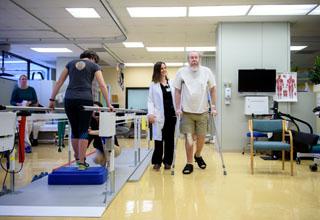The Benefits of Speech-Language Pathology for Seniors
Learn more about how speech-language pathologists specializing in the care of seniors can help with communication skills, cognitive function, and swallowing.

Human beings are social animals and communication is essential to who we are. From low-stakes situations like ordering a scoop of your favorite ice cream to more important messages like telling someone you love them or letting a doctor know you’re experiencing pain, speech-language pathologists are central to keeping us happy, healthy, and socially engaged. Medical conditions that impact the ability to communicate are treated by speech-language pathologists.
As we age, our ability to speak clearly or to swallow may be affected by a number of factors, including neurodegenerative conditions such as Parkinson's disease or dementia, pulmonary or cardiac conditions, some kinds of cancer, brain injury, stroke, or even some medications, to name a few. When most people think of speech-language pathology, they probably imagine someone helping a child who stutters, but speech-language pathologists specializing in the care of seniors can help with a range of conditions common in older people.
What Do Speech-Language Pathologists Treat?
Speech-language pathologists treat a wide range of conditions affecting speech, language, voice, cognition, and swallowing. Some of the most common conditions in older adults include:
- Dysarthria is a speech disorder that can result from weakened muscles or from the inability to control the muscles used for speaking. Dysarthria often causes slurred or slow speech that can be difficult to understand. A speech-language pathologist can help identify the type of dysarthria you have and may assign strategies to improve the clarity of your speech, and improve breath control.
- Apraxia affects the brain’s ability to plan and direct the movements needed to correctly order and activate speech. It is a neurological disorder and is not caused by muscle weakness. Someone suffering from apraxia may have slow or slurred speech, difficulty pronouncing words correctly, and may distort sounds or make errors of stress, tone, or rhythm, among others. Treatment will focus on training your muscles to move correctly to make the sounds you want to make. A speech-language pathologist may help you slow down your speech or may assign repetitive exercises set to a beat to help retrain speech motor patterns.
- Aphasia is a language disorder that affects the ability to communicate which includes the ability to understand spoken language, verbally express language, read, and write. People with aphasia may struggle to find the right words to express themselves, have trouble organizing words and constructing sentences, and have difficulty understanding spoken and written language. Treatment may include techniques and strategies to help improve language skills as well as to compensate for challenges communicating. Your speech-language pathologist will work with you to set appropriate treatment goals and can work with your family as well.
- Cognitive disorders: People who have had a brain injury or stroke, or have been diagnosed with a neurodegenerative disease may experience changes in cognition or “thinking.” Examples of these challenges may include difficulties paying attention, remembering new information, and solving daily problems.
- Dysphagia, or difficulty swallowing, involves much of the same anatomy as speech and is also treated by speech-language pathologists. Dysphagia can occur due to a variety of conditions such as stroke, some cancers, dementia, Parkinson’s disease, significant pulmonary problems, uncontrolled acid reflux, and more. Sometimes the muscles and other body parts we use to swallow can change in ways that make it more difficult to chew and swallow foods and drinks safely and efficiently. Dysphagia can result in food going down the wind pipe (trachea) toward the lungs, instead of down the esophagus to the stomach. If food gets into the lungs via the trachea, it can contribute to pneumonia. Inability to swallow effectively may also result in weight loss and malnutrition. People may have trouble swallowing solids, liquids, or both. Speech-language pathologists can help by evaluating the underlying problem and may assign interventions such as a change in diet or exercises to strengthen the muscles used in swallowing.
Patient-Centered Treatment Goals
The main goal of speech-language pathology is to help the person undergoing the therapy reach their maximum rehabilitation potential. Using their clinical expertise, speech-language pathologists create individualized treatment plans with patient-centered goals designed to motivate a patient to accomplish them. With a patient’s permission, a speech-language pathologist may also work with the medical team, social workers, and family to provide a coordinated, ongoing interdisciplinary plan for their care.
When Should You See a Speech-Language Pathologist?
If you or a loved one experiences changes in speech such as slurred or slowed speech, difficulty finding the right words, are experiencing an acute change in memory or thinking skills or if you have trouble chewing or swallowing, it is recommended that you talk with your primary care provider to see if a speech-language pathology evaluation is right for you.
Outpatient Speech Therapy in Boston and Dedham
Hebrew SeniorLife offers speech-language pathology for seniors at Hebrew Rehabilitation Center in Boston and at NewBridge on the Charles in Dedham. Contact us online or call outpatient rehabilitation in Boston at (617) 363-8539 or Dedham at (781) 234-9630 to set up an initial evaluation to determine candidacy for treatment.
Caitlin Pender also contributed to this blog post.
Learn More
Outpatient Rehabilitative Therapies
At Hebrew Rehabilitation Center in Boston and Dedham, MA, we offer adult physical therapy, occupational therapy, and speech therapy using state-of-the-art mobility and treatment equipment.





